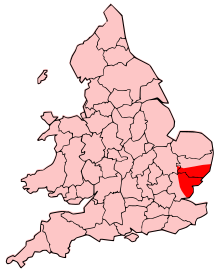Trinovantes
| Trinovantes | |
 |
|
| Geography | |
| Capital | Camulodunon (Colchester) |
|---|---|
| Location |
Essex South Suffolk |
| Rulers |
Imanuentius(?) Mandubracius Addedomaros Dubnovellaunus Cunobelinus |
The Trinovantes or Trinobantes were one of the Celtic tribes of pre-Roman Britain. Their territory was on the north side of the Thames estuary in current Essex and Suffolk, and included lands now located in Greater London. They were bordered to the north by the Iceni, and to the west by the Catuvellauni. Their name possibly derives from the Celtic intensive prefix "tri-" and a second element which was either "novio" - new, so meaning "very new" in the sense of "newcomers", but possibly with an applied sense of vigorous or lively ultimately meaning "the very vigorous people. Their capital was Camulodunum (modern Colchester), one proposed site of the legendary Camelot.
Shortly before Julius Caesar's invasion of Britain in 55 and 54 BC, the Trinovantes were considered the most powerful tribe in Britain. At this time their capital was probably at Braughing (in modern-day Hertfordshire). In some manuscripts of Caesar's Gallic War their king is referred to as Imanuentius, although in other manuscripts no name is given. Some time before Caesar's second expedition this king was overthrown by Cassivellaunus, who is usually assumed to have belonged to the Catuvellauni. His son, Mandubracius, fled to the protection of Caesar in Gaul. During his second expedition Caesar defeated Cassivellaunus and restored Mandubracius to the kingship, and Cassivellaunus undertook not to molest him again. Tribute was also agreed.
...
Wikipedia
